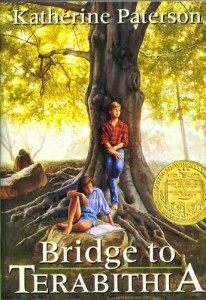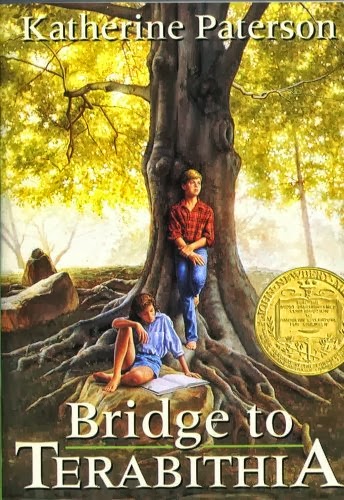This week’s Flashback Friday: Bridge to Terabithia by Katherine Paterson.
While not normally listed or thought of as fantasy novel, this book certainly has fantastical elements to it. We read Bridge to Terabithia in 6th grade reading class. Just the word–Terabithia–fascinated me.
What was Terabithia? Why wasn’t it spelled T-E-R-R-A-B-I-T-H-I-A?
Surely the author was playing off of Terra, as in Earth?
I couldn’t wait to get home and get started. This was unusual for me because like most kids, I would have rather read something I wanted to read rather than what the teacher had assigned.
 3:00 PM rolled around and I was out the door, down the street, and into a tree, much like the characters on the cover.
3:00 PM rolled around and I was out the door, down the street, and into a tree, much like the characters on the cover.
In typical me fashion, I’d finished the book before my father got home from work (around 6:30 PM).
This was the first book I read in which a main character died (well, as long as you don’t count Shakespeare, but I didn’t always get that the characters there were truly dead since there were always ghosts about). I sat in the tree, crying my eyes out and cursing Ms. Paterson’s name.
That evening, my father and I had a lengthy conversation about children and death–the idea that kids could and did die from cancer (or other ailments) and car accidents and countless other things that didn’t make a lot of sense.
The world was cruel and harsh. And new–I looked upon it with new eyes. It wasn’t just the elderly that died. (This also led to me asking a lot of religious questions about God letting kids die, much to my father’s chagrin.)
Before Harry Potter, The Hunger Games, Divergent, and other popular books killed off characters, there was this story. The rawness of how and why the character died left me angry and confused. I returned to school the next day with a laundry list of questions.
In reading class, I raised my hand. Ms. Bryant pointed to me and I blurted out, “Why did she die?! That’s not fair.”
The entire class groaned. I’d gone and spoiled the book for them. No one wanted to read it if the character was going to up and die like that.
It was pretty much akin to yelling, “Snape kills Dumbledore!”
After that, our teacher didn’t call on me very often as I was usually the first to finish reading a book. I tried not to spoil things after that day, but the damage was done.
Class aside, Bridge to Terabithia taught me two important lessons about writing:
1) Be careful when killing main characters.
2) If you’re going to kill a major character, make it count.
Connie Willis (in her writing workshops) has a slightly different take on this idea.
1) Don’t kill the puppy.
2) Don’t kill the character who acts as the puppy
But sometimes major characters (and puppies) have to die. I think killing them without purpose or for the shock factor (waves a fist at G.R.R.M.) is cruel, but sometimes story arcs require a sacrifice. Some of the best heroes work because their story is tragic. A great example of this is from The Never-ending Story.
When Atreyu’s horse, Artax, dies, the creators are killing the puppy. It’s necessary and brutal. The emotional hook it creates is amazingly well done and keeps the viewer engaged with the story.
I felt it was fitting to do Bridge to Terabithia as a Flashback Friday because of the brutal lessons it taught me so long ago. Melanie Rawn further developed my understanding of this lesson a year later–both in how to and how not to kill characters.
I’ve killed characters and puppies both in the works I’ve written, but I’ve done it with care–because of the character or plot dictates it must happen.
Whether you prefer works that take risks or not, character death stays with us. Readers feel the loss and grieve. The handling of it is tricky work–but work worth doing.



One Reply to “Flashback Friday: Bridge to Terabithia”